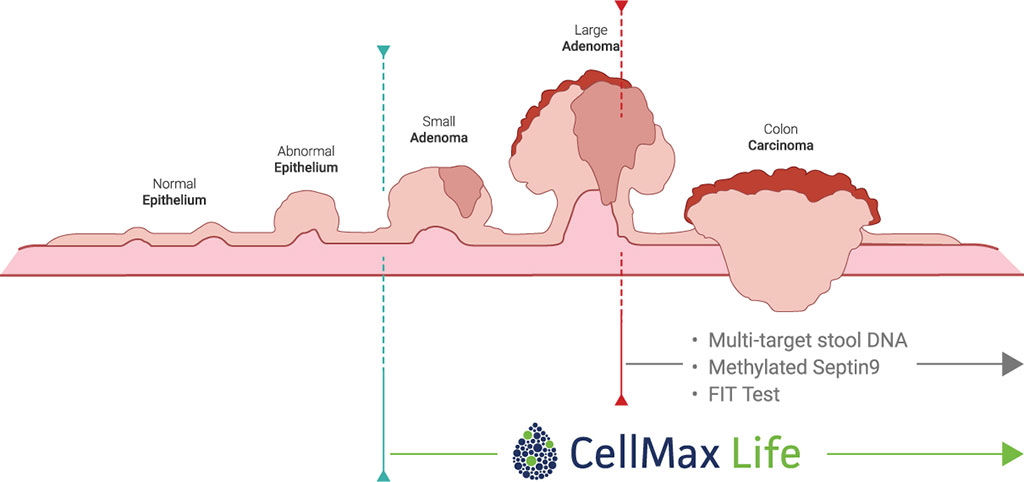Non-Invasive Blood Assay Can Detect Early Colorectal Cancer
By LabMedica International staff writers
Posted on 21 May 2020
Colorectal cancer (CRC), also known as bowel cancer, colon cancer, or rectal cancer, is the development of cancer from the colon or rectum (parts of the large intestine). In general, colon cancer begins when healthy cells in the colon develop changes (mutations) in their DNA and as the cells accumulate, they form a tumor. Posted on 21 May 2020
Doctors recommend certain screening tests for healthy people with no signs or symptoms in order to look for signs of colon cancer or noncancerous colon polyps. Finding colon cancer at its earliest stage provides the greatest chance for a cure and screening has been shown to reduce the risk of dying of colon cancer.

Image: Schematic diagram of the Adenoma-Carcinoma Sequence; a non-invasive blood assay, FirstSightCRC, can detect early colorectal cancer (Photo courtesy of CellMax Life).
Medical Scientist at the Stanford University Medical Center (Stanford, CA, USA) evaluated a novel blood-based assay in a single-center, blinded study conducted at the Veterans Affairs Palo Alto Health Care System (Livermore, CA, USA). The study included 354 patients with no prior CRC diagnosis who were scheduled for colonoscopy. Among these patients, 86% were asymptomatic and 14% had symptoms or a positive fecal immunochemical test.
Prior to colonoscopy, investigators drew blood samples to be analyzed by the test FirstSightCRC (CellMax Life, Sunnyvale, CA, USA), a test that focuses on three biomarkers, circulating gastrointestinal epithelial cells, somatic mutations and methylation of cell-free DNA. The scientists developed a quantitative age- and sex- adjusted composite CMx Score from 0 to 100.
The scientists in their analysis determined that the test achieved a specificity of 90% and sensitivity of 100% and 76% for the detection of CRC and advanced adenomas, respectively. They also found an association between the CMx Score and disease severity. The score also correlated with the size of the index adenomas.
The study included several patients who had elevated CMx Scores but had negative colonoscopies. After reviewing patient histories, the investigators found a prior history of advanced adenoma removal in most cases. This knowledge revealed the potential to achieve an even higher specificity with the test.
Shai Friedland, MD, a professor of medicine and the senior study author, said, “The blood test has the potential to fill an unmet need by giving patients a highly sensitive, convenient option for colorectal cancer screening. We have continued to enroll patients at the Palo Alto VA to prospectively validate the blood test. The results will be available soon, and I can tell you they look extremely promising.” The study was presented at the virtual meeting held May 2-5, 2020 of the Digestive Disease Week.
Related Links:
Stanford University Medical Center
Veterans Affairs Palo Alto Health Care System
CellMax Life













